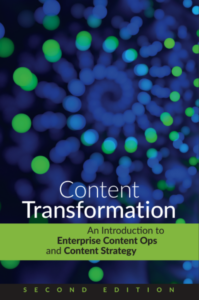2022 podcast roundup
We had an amazing lineup of guests and topics on our podcast in 2022. Here are some short highlights to help you figure out which episodes you might want to catch up on (the links take you to the individual episodes, where you will find the transcript and a link to the audio file).
“ContentOps is a set of principles. And I think that’s important. It’s principles that we use to optimize content production and to leverage content as business assets to meet business objectives. It’s all about efficiency.”
Rahel Anne Bailie of Content, Seriously and ICP on the rise of content ops
“It’s an interesting time, the last couple of years with the pandemic and some of the changes that have been just general in any kind of industry that whole quote unquote “Great resignation” is that really impacting us. I would say there’s definitely been challenges as managers of people are leaving, people are not necessarily leaving the industry, but redistributing is what I’ve seen a lot within my clients of, oh, there’s greener pastures over here, there’s a bit more competition, I guess, for getting people. And I’ve got a lot of people who keep coming to me and saying, “What do we do to attract people?” And there’s been some interesting challenges associated with, well, what are we looking for? What kinds of people should we be looking for? How do we make the industry as a whole more attractive?”
Dawn Stevens of Com-Tech Services on techcomm trends
“[…] Content as a Service makes the most sense and [has] the biggest impact, it’s typically in business functions, where there is a necessity to either deliver less content to make it more easily digestible, more quickly digestible, get people to an answer or to a resolution faster, or content specifically that has an aspect of confidentiality or security or privilege.”
Patrick Bosek of Heretto on Content as a Service (part 1 and part 2)
“The foundation for the web content accessibility guidelines is a set of four principles, using the acronym POUR, P-O-U-R. Content has to be perceivable. You have to be able to get it from the screen into the user’s head. It has to be operable. The user has to be able to jump around, enter data, actually use whatever content is online. It has to be understandable. The user, once it is in their head, has to be able to decipher it and make sense of it. And then the content must be robust. So if there’s a failure, there’s a fallback, so that the accessible content is still perceivable, operable, understandable to the user. And this is actually not just a backwards compatibility requirement. It’s a forward compatibility requirement. So content has to be compatible with future technologies, not just with current technologies.“
Bob Johnson of Tahzoo on authoring for accessibility
“We’ve worked on a few projects now where we’re harvesting this complex legal and regulatory content from public websites. And we’re seeing this trend in several industries. I’ve seen it in the financial industry. We’re seeing it in insurance and legal and accounting. And what’s going on is there’s all this information that appears only in public websites, this legal and regulatory type information. And their sites are constantly being updated with new content, modified content. It’s just so hard for people to keep track of it, for companies especially to keep track of it. And it’s extremely valuable, but there’s no standard for it or anything. And it’s a real challenge for companies that need that data so they can be in compliance.”
Amy Williams of DCL on digital transformation
“Industry 4.0 is more about classic manufacturing industries and production processes and what we call the smart factory. And it refers to intelligent networking of machines and processes in the industry with the help of information and communication technology. That’s more an industry thing while IoT [Internet of Things] is very often also about the end consumer Smart Home and things like that. And that is Smart Home and things like that are not so much in the focus of Industry 4.0 there we really talk about things like smart factories, smart machines that can communicate with each other and where content and data is used in new ways.”
Stefan Gentz of Adobe on Industry 4.0
“We’re converging two groups together, they’ve got different metadata and attribute models, and they probably have different topic models and bookmaps versus DITA maps. And it’s a great time to make alignments when you’re going to be cleaning up and trying to reuse this across these different systems. One customer I worked with, there are three or four different mergers of different companies, and they did eventually, they chose to centralize on Tridion Docs. But they decided to maintain their existing content models because the marketing wasn’t really recombining new products, and so forth, they were still kind of siloed with their products, but they were able to have their own publishing DITA Open Toolkit chains and so forth. And it worked okay, but I wouldn’t want to try to reuse across the content.”
Chip Gettinger of RWS on replatforming
“There has been a real interest in, again in job posts, technical writer job posts that are looking for Markdown experience. Quite recently, in fact, I think within about the past year or so, the request for people having Markdown experience now exceeds that of DITA.”
Keith Schengili-Roberts of ditawriter.com on the techcomm job market
“Readers do care, even if they don’t know it, they don’t know it’s structured authoring. But again, it’s all about intuition. If someone wants to know how do I do something, they’re going to look automatically for numbered steps, procedures. And if you give them a paragraph, yeah, they’re going to be pretty angry.”
Jo Lam of Paligo on Misconceptions about structured content
“I think the biggest challenge [in moving to a headless CMS] is the content creation world. The content strategy world is not ready for that. And not because people don’t get it, it’s because they don’t even know what they don’t know. Most organizations are not mature enough in their content operations to really take advantage of a headless CMS. And so the danger becomes the tech. IT moves them there because they need it for their tech ecosystem. And then they’re given the keys. I’ve heard some people say they’re given the keys to a Lamborghini and they don’t even have their driver’s license yet.”
Carrie Hane of Sanity on What is a headless CMS?
Many thanks to our special guests, who shared all sorts of interesting ideas.
Who would you like to hear from in 2023? Tell us about your favorite content people in the comments.


